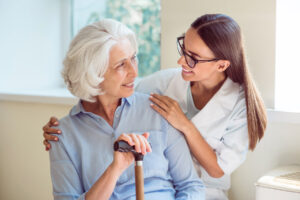Celebrate the Roles of Nurses and Nursing Assistants in Home Health Care
National Nursing Assistants Day falls on June 16th. Have you considered the roles of nurses and nursing assistants in senior care and home health care? The role of certified nursing assistants, licensed practical nurses, registered nurses, and licensed vocational nurses determines what they can do to help your mom with her medical condition or post-surgery care at home.
What Is Home Health Care?
Home health care offers care services that are more medical in nature. Not every nurse is able to complete every home health care service. Depending on your mom’s health needs, she might require:

Home Health Care Upper Darby, PA: Roles of Nurses and Nursing Assistants
- Catheter care
- Diabetes education
- Dietary education
- Feeding tube care
- IV lines and injections
- Medication administration
- Ostomy care
- Physical/occupational/speech therapy
- Post-surgery care at home
- Vital signs monitoring
- Wound and incision care
Not every nurse is able to do every task. To better understand their roles in home health care, here’s a quick guide to all that nurses do when it comes to helping your mom with her healthcare needs.
Nurses in Home Health Care
There are a handful of types of nurses that may work for a home health care agency. Most of the time, you’ll be working with a CNA if your mom needs help with bathing, toileting, and nail care. For home health care services, expect your mom to be under the care of an RN most of the time.
Certified nursing assistants (CNAs) often get on-the-job training. They need a high school diploma or GED and work for a company while getting their CNA certificate. A CNA is usually only able to take vital signs, assist with personal care, and help with repositioning to prevent pressure sores. Typically, CNAs work more in senior care services providing personal care.
Licensed practical nurses or licensed vocational nurses attend a certificate program in a community college or vocational school. They can collect blood and urine samples, help with catheter care, change bandages, and take vital signs. They typically report to an RN.
Registered nurses attend college and get their bachelor’s or associate’s degree. RNs administer medications through IVs and needles. They can monitor vital signs and work directly with doctors. They also are able to educate families about the care their parent or other family member requires.
Home care registered nurses specialize in providing the home care services a patient needs. They may help prepare equipment like a dialysis machine or oxygen tank and instruct patients and their family members on what happens next. They’ll also help with tasks like colostomy care and feeding tube management.
Hire home health care services when your mom needs care services that involve medical knowledge. Whether her doctor recommends that she has someone check her healing incision every day or wants your mom to have her vital signs taken each day, home health care is the perfect solution. Call to learn more.
If you or an aging loved one are considering Home Health Care in Upper Darby, PA please contact the caring staff at True Direct Home Health Care today.
Sources:
https://www.bls.gov/ooh/healthcare/registered-nurses.htm#tab-2
https://www.bls.gov/ooh/healthcare/licensed-practical-and-licensed-vocational-nurses.htm#tab-2
https://www.bls.gov/ooh/healthcare/nursing-assistants.htm#tab-2
- How Home Health Providers Offer Education Amidst Physical Health Changes - March 5, 2024
- Spring Activities for Seniors - February 21, 2024
- How to Help an Older Loved One with Cataracts? - February 6, 2024
